Category / Research news
New BU Nepal migration health paper published
Last week the scientific journal Tropical Medicine & Infectious Disease informed us that our paper ‘A Qualitative Insights into Pre-Departure Orientation Training for Aspiring Nepalese Migrant Workers’ has been accepted for publication. This paper is part of a Special Issue of the journal with the title Contemporary Migrant Health, 2nd Edition). Tropical Medicine & Infectious Disease is an Open Access journal, which means it is freely available to anybody in Nepal (and the rest of the world) with internet access. The lead author of our latest health and migration article is Dr. Pramod Regmi in the Department of Nursing Science and his Bournemouth University co-authors are: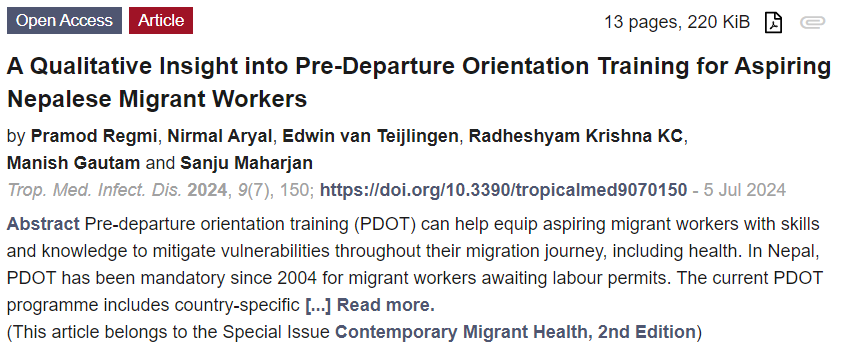 Dr. Nirmal Aryal and Prof. Edwin van Teijlingen.
Dr. Nirmal Aryal and Prof. Edwin van Teijlingen.
Reference:
- Regmi, P., Aryal, N., van Teijlingen, E., KC, R.K., Gautam, M., Maharjan, S. (2024) A Qualitative Insights into Pre-Departure Orientation Training for Aspiring Nepalese Migrant Workers, Tropical Medicine & Infectious Disease 9(7), 150;https://doi.org/10.3390/tropicalmed9070150.
MRes studentship opportunities – application deadline extended to 14th August, 2024
Update about the NIHR INSIGHT programme MRes studentship eligibility which impacts on the current recruitment round.
Following consultation with the 12 regional leads for the NIHR INSIGHT programme, NIHR has agreed to Research Masters studentships being open to applicants with up to five years’ experience of practice in the health or care profession for which they hold the required registration. It is still possible to provide flexibility for instances such as career breaks or time out for caring responsibilities so long as experience of practice fits with this guidance.
In light of the above changes, the deadline for applications for the Research Masters Studentships for South West Central have been extended to Wednesday 14th August 2024 to allow for applications for those who may now meet the eligibility criteria. Information about how to apply is available on our webpage: https://insight-southwestcentral.net/
There was also discussion about health and care professionals working on skilled worker visas and the requirements for Research Masters studentships in line with all applicants, only those with up to five years’ experience of practice (UK and international practice) will be considered. Those on skilled worker visas will need to be employed on a full-time basis and given clinical release to undertake the MRes programme (0.4FTE). The studentship stipend can be paid to employers to offset the cost of clinical/care release. However, this will mean that employers will need to subsidise the difference in salary costs. This will need to be discussed and negotiated on an individual basis where employers deem it appropriate.
If you have any queries, please contact Carol Clark (cclark@bournemouth.ac.uk) or Theo Akudjedu (takudjedu@bournemouth.ac.uk) or Les Gelling lgelling@bournemouth.ac.uk
A successful second Women’s Health Research Symposium
The Centre for Midwifery and Women’s Health hosted their second Women’s Health Research Symposium on Tuesday 25th June 2024, sharing women’s health research from across Dorset.
The event was funded by the Centre for Midwifery and Women’s Health, The Women’s Academic Network, and The Doctoral College. The event provided an opportunity for academics, clinicians, researchers, and third-sector organisations to network, discuss ideas, and outline key priorities in women’s healthcare.
The themes of the presentation mirrored the priorities of the Women’s Health Strategy for England including tackling inequalities and wider determinants of health, improving access to services, health promotion through education, women’s mental health, and supporting women’s health throughout the life course. Keynote speakers included Dr Michael Dooley, Visiting Professor at BU (Bournemouth University) and Fellow of the Royal College of Obstetricians and Gynaecologists, Helen Crook, Strategy and Transformation Programme Manager leading on the Dorset Women’s Health Hub, and Marianne Storey, Chair of the Dorset Women CIC.
Part-funded by The Doctoral College Culture and Community grant, the event aimed to highlight the work of our postgraduate researchers. A range of posters and oral presentations were delivered by BU postgraduate students including Rosie Harper, Eunhee Kim, Umarah Mahmood, Sara Ahmadi, Pritika Gurung, Megan Chesters, Abier Hamidi, Kate Rattley, and Nurudeen Adesina.
Academics from the BU Centre for Midwifery and Women’s Health also discussed new research findings including new consensus recommendations on cold water swimming in pregnancy (Dr Malika Felton) and the lived experience of LGBTQ+ parents who breast/chest-fed their children (Dr Sarah Hillier). We also welcomed Associate Professor Alyx Taylor from AECC University College to discuss her work around the identification of perinatal mental health needs.
In addition to a range of engaging oral presentations, we invited Dr Humaira Khan (AECC University College) to display her foetal alcohol syndrome simulator, and Pauline Ferrick-Squibb (Arts University Bournemouth) to showcase her quilt that was created through participatory research with women sharing their experience of menopause. The event concluded with a panel discussion with BU’s Women’s Academic Network and research centres including the Centre for Midwifery & Women’s Health, Ageing & Dementia Research Centre, andCentre for Seldom Heard Voices.
The second Women’s Health Research Symposium was a success, and we look forward to inviting delegates back to the university next year. The event provided an opportunity for academics, clinicians, and stakeholders to make collaborative partnerships to improve women’s health across Dorset.
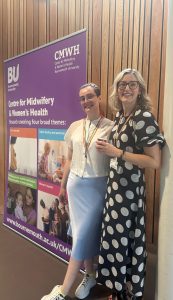
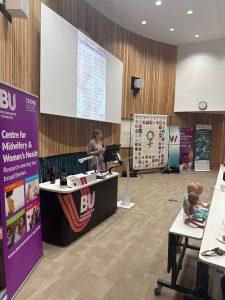
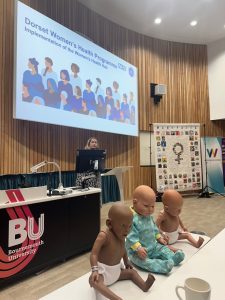
British Academy Global Professorships 2024 Internal competition
 British Academy has launched their Global Professorships
British Academy has launched their Global Professorships
The British Academy Global Professorships scheme aims to support internationally recognized scholars by funding four-year research projects in the UK as an opportunity to undertake high-risk, curiosity-driven research in the humanities and social sciences in a UK research institution.
1. **Eligibility**:
– Applicants should be internationally recognized mid-career and senior scholars, in any discipline within the humanities and social sciences (recognised in their field or with exceptional promise) who are currently employed outside the United Kingdom.
– Must hold a doctoral degree and have a significant publication record.
-Applicants can be of any nationality but they must be based outside of the UK at the time of application.
2. **Funding**:
– The award provides up to £900,000 over four years.
– Covers salary costs, research expenses, overheads and relocation costs.
3. **Application Process**:
– The application is submitted by the UK host institution.
– Includes a detailed research proposal, budget, and support statements from the host institution.
– The deadline for submissions and specific guidelines are detailed in the call for applications.
4. **Selection Criteria**:
Applications will be assessed against the following criteria:
- The excellent research track record and/or promise of the applicant;
- The quality, ambition and originality of the proposed research vision and programme, with the aim to support state-of-the-art applications that break new ground;
- The distinct research contribution and added value that the applicant will be able to make to the UK host institution, and the suitability of the UK host institution for the applicant’s research project that enables the award-holders and their UK host institutions to achieve a step change in their respective research programmes;
- Whether the gender equality statement meets or exceeds the minimum standard as set out in the Gender Equality in Research and Innovation policy;
- Value for money
- Support from the host institution.
For more details, refer to the British Academy’s official guidance notes (https://www.thebritishacademy.ac.uk/funding/global-professorships/guidance-notes/).
Application Process
Due to Demand management, set by BA for this call, BU can submit a max of 4 applications- candidates must contact Eva Papadopoulou, to express their interest request over email, and submit a draft copy of their Flexi-Grant proposal, where the above criteria will need to be addressed. Please do so by the 26th July. Any queries please contact Eva Papadopoulou.
The ADRC Ageing Well Together event was a great success
The Ageing & Dementia Research Centre hosted a free public event in June with 52 attendees from local organisations, members of the public and researchers. The purpose of the event was to bring people together to showcase research and initiatives around the theme of ageing well.
Key speaker
The key speaker of the event was Rachel Woodward Carrick, speaker and author of Happy Silver People: How to make life happier as you grow older within the BGB lecture theatre.
Presentations/showcase
Both Mel Hughes and Angela Paget from PIER shared some of their learning from a collaboration with the BCP Age Friendly Communities network.
Here are some words from Mel summarising the collaboration – The BU PIER partnership have been supporting this work as forum and steering group members from the start and so it felt a natural opportunity to collaborate when we were asked to start a conversation with older people across Bournemouth, Christchurch and Poole, on envisioning an age friendly community. We used appreciative inquiry and the 4D model of discover, dream, design and deliver to provide a framework for a series of workshops conducted in March 2024 with Age Friendly partners, Beautiful Wisdom, Salvation Army, Prama Care and Christchurch Community Partnership. We posed the same question to the conference attendees – if there are no limits, what, for you does an age friendly community look and feel like. It was great to see how open and engaged the attendees were to envision an age friendly community and the steps they would take to making it a reality. We are excited to share the report from the March conversations in July.
There were tables set up in BG 115 and 116 where local care organisations showcased their services and BU research staff showcased their research allowing people to browse their stands and to ask questions, as well as getting hold of some much-favoured merchandise! There was also a visit from the very special Nelly the therapy dog from the company ‘Hey Doggie’ with her owner Jacqui, who we have built a good relationship with having first met them at the Dog Café event at the Potteries Care Home (this takes place the second Wednesday of each month).
There was also the chance to hear from the ADRC Research Participant Group, who shared their experiences of contributing to research. This group meets monthly via Zoom with two in-person meetings taking place each year. We are always looking for new members of the public to join this group. Further details can be found on www.bournemouth.ac.uk/adrc (if you know of anyone who would be interested in joining or if you are a BU researcher who would like to present your research at one of these monthly meetings, in order to get public engagement with your project).
Yoga activity
After a very successful morning at the event, we were joined by a Sport BU yoga teacher, Melsia Tomlin-Kraftner, who gave us all an introduction to Chair Yoga in the lecture theatre, this was a very engaging and informative session on the benefits of regular movement as we age, as well as providing a lot of laughs from those participating.
Event highlights
Associate Professor Susan Dewhurst and Associate Professor Michele Board the co-lead of the centre and Dr Michelle Heward the deputy co-lead of the centre have provided their best bits of the event below:
- My highlight was the atmosphere and energy that was present in the showcase event. Given the diversity of tables, there was something for everyone, making it a really inclusive event (Dr Susan Dewhurst).
- It was very much an example of a collaborative, community event with sharing of expertise about ageing (the lived experience!) and research we are doing to promote healthy ageing and raising our understanding of people living with dementia (Dr Michele Board).
- Hearing from members of the public about their involvement in ADRC research and what it meant to them was a powerful reminder of the impact that our research can have on our local community. Attendees gave positive feedback about the event, one attendee said, ‘Interesting talks in the lecture theatre, fascinating info and chat in the ‘break out room’ and especially great to meet the research students – such a credit to BU! I found it all energising and stimulating and am better informed all round after attending’ (Dr Michelle Heward).
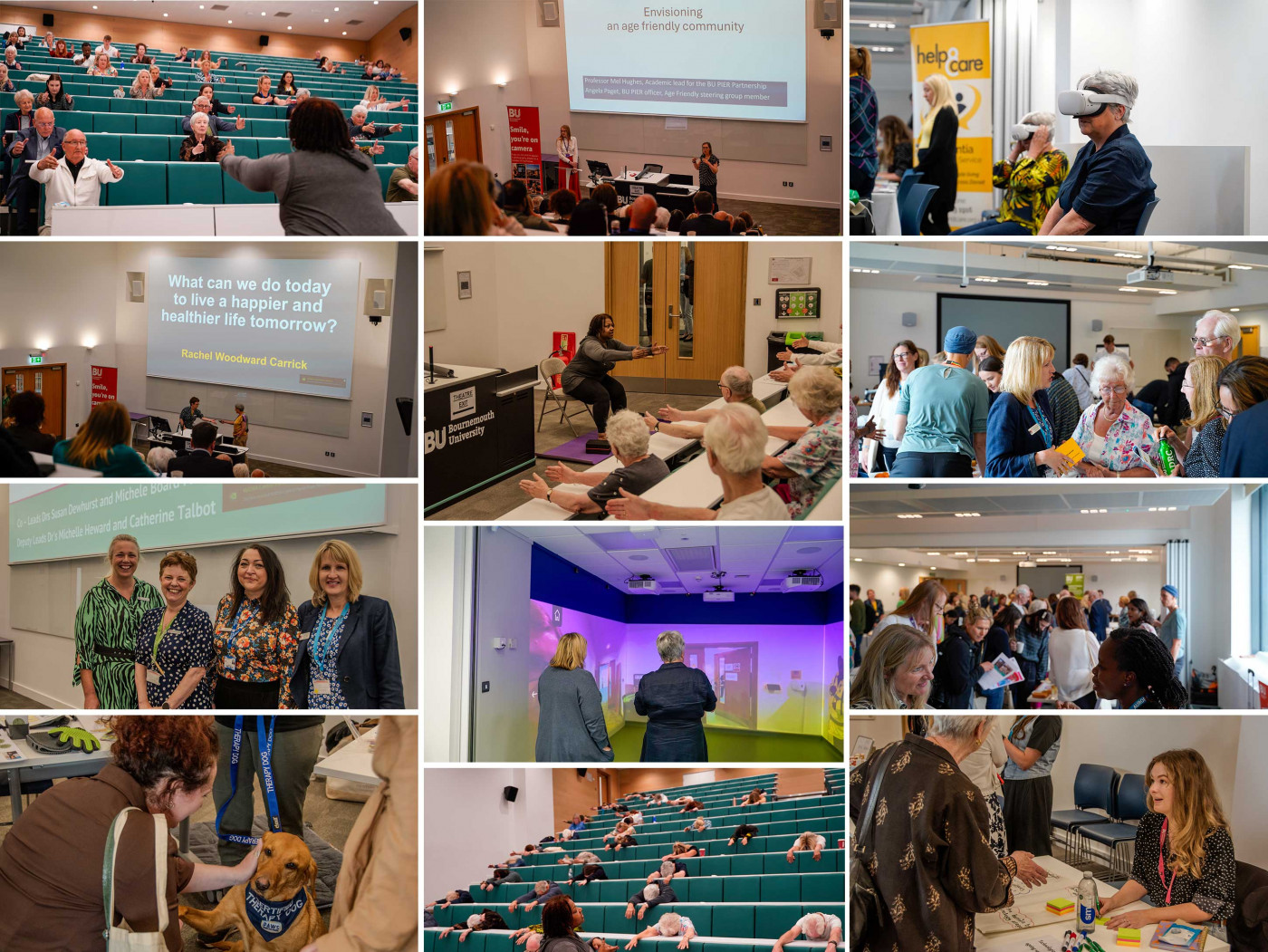
The work of the ADRC focuses around maintaining good quality of life as we age and supporting those living with long-term conditions in older age, such as dementia. Please follow us on social media @BournemouthADRC to keep up to date with our latest news and visit our website www.bournemouth.ac.uk/adrc to check out more about our research and our education and training resources.
RKEDF July Digest – Training opportunities for YOU!

Have you heard the news!!!!!!
We are excited to share some great RKEDF training opportunities coming up in July 2024!
Click on the titles to find further details and book your place!!!!
AHRC & ESRC: How to write an application in the new format for the Funding Service
Thursday, July 4, 11:00 – 13:00 – Online
The session will cover the requirements for the new UKRI application format. We will discuss the application structure focusing on AHRC and ESRC and the sections and how to complete them. The session will be framed with more general information on the various Research Councils that comprise UKRI and best practice in writing applications for external research funding.
Principal Investigation – Post Award for RKE
Wednesday, July 10, 14:00 – 15:00 – Online
This session is aimed at any researcher who is, who plans to be, a Principal Investigator for an externally funded research or knowledge exchange project.
New Generation Thinkers 2025 – AHRC/BBC Radio 4
Thursday, July 11, 11:00 – 13:30 – F112 – Fusion Building – Talbot Campus
This is our annual new generation thinkers’ workshop, where we look at the call, requirements, eligibility and having a panel chair and member’s point of view. For early career researchers and PGRs who want to share their research with the public.
Call information: Develop your media skills with the New Generation Thinkers scheme. The scheme is a partnership between the Arts and Humanities Research Council (AHRC) and the BBC.
Building a Policy Influencing Strategy
Friday, July 12, 9:30 – 16:30 and Thursday, July 18, 9:00 – 16:00 – Zoom
A one-day online workshop for up to eight researchers, delivered via Zoom and facilitated by public affairs and policy consultant Carys Davis, from The Other Place.
The session will enable participants to:
- develop key messages, supporting narratives and evidence, identify and map their audience, gain insight into the channels available for influencing.
RKEDF: ECRN: Where do you begin with Research funding?
Friday 12th July – 10:00-12:00 – Online
The workshop is aimed at researchers from across BU at either postdoctoral or early career stage. It will focus on funders including (but not limited to) the AHRC, UKRI, British Academy, Welcome Trust, and NIHR.
Are you an Early Career Researcher interested in applying for research funding but unsure where to start? In this BU ERC Network special session, professional bid writing consultant Sally Baggott (PhD) offers her insights in the contemporary funding landscape for ECRs,
———————————————————————————————
Please assist us in avoiding any waste of resources; make sure you can attend or cancel your booking prior to the session.
For more training opportunities, please visit the ‘SharePoint site’ here.
For any further information, please contact: RKEDF@bournemouth.ac.uk
New sociology paper Freedom from Academentia
Congratulations to Laura Favaro, Lecturer in Social Science in the Faculty of Health & Social Sciences, who published the paper ‘Let us be free from “ACADEMENTIA”’ this last weekend of June [1]. “Survivor of academentia” is how one former lecturer in sociology described herself when to Laura interviewed her for her ethnography of academia. In particular, the research explored the “gender wars”, namely the disputes around sex and gender that have escalated dramatically since the mid 2010s in Britain and increasingly also in many other countries. This article builds on feminist and other critical uses of the term academentia with original insights from interview and document data about the detrimental impact of queer theory and politics. The hope is to stimulate further inquiry into the push towards queering at universities, and beyond, as well as into the connections between the
transgender and mad movements.
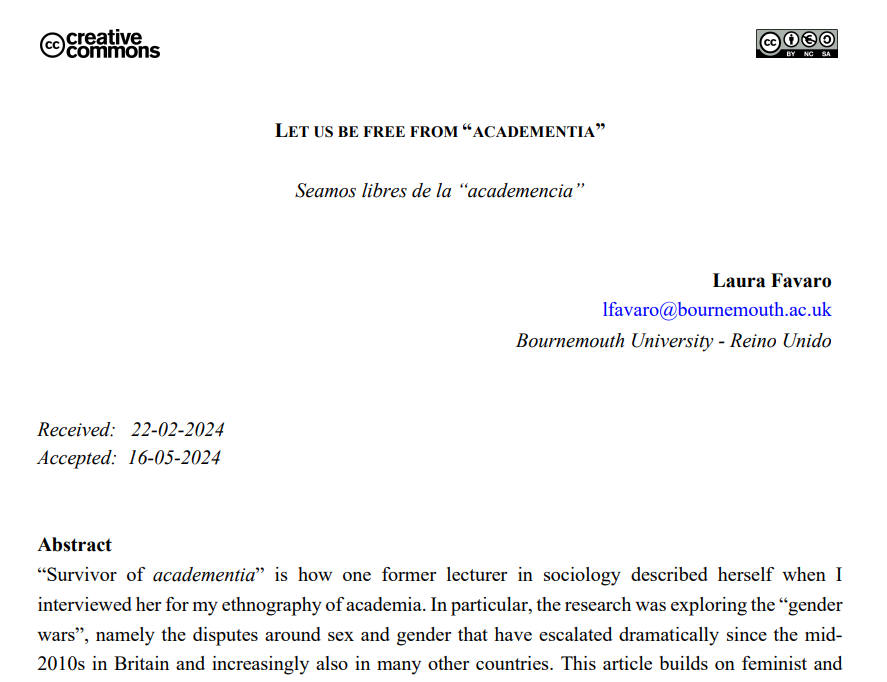
Well done!

Prof. Edwin van Teijlingen
Centre for Midwifery & Women’s Health
Reference:
Favaro, L. (2024) Let us be free from “Academentia”, Cuestiones de género: de la igualdad y la diferencia. Nº. 19: 659-92.
BU academic visiting Malaysia
Dr. Nirmal Aryal, who is a part-time researcher in the Department of Nursing Sciences, is in Malaysia this week to prepare further migrant-health research collaborations and plans. His trip is part of the Faculty of Health & Social Sciences (FHSS) seed-corn funding for Early Career Researchers. In Malaysia Nirmal has conducted several PPIE (Patient and Public Involvement and Engagement) events with migrant workers and stakeholders, including current Nepalese migrant workers. Nirmal is working closely with Dr. Pramod Regmi and Prof. Edwin van Teijlingen (both based in FHSS) in the field of the health and well-being of Nepalse migrant workers.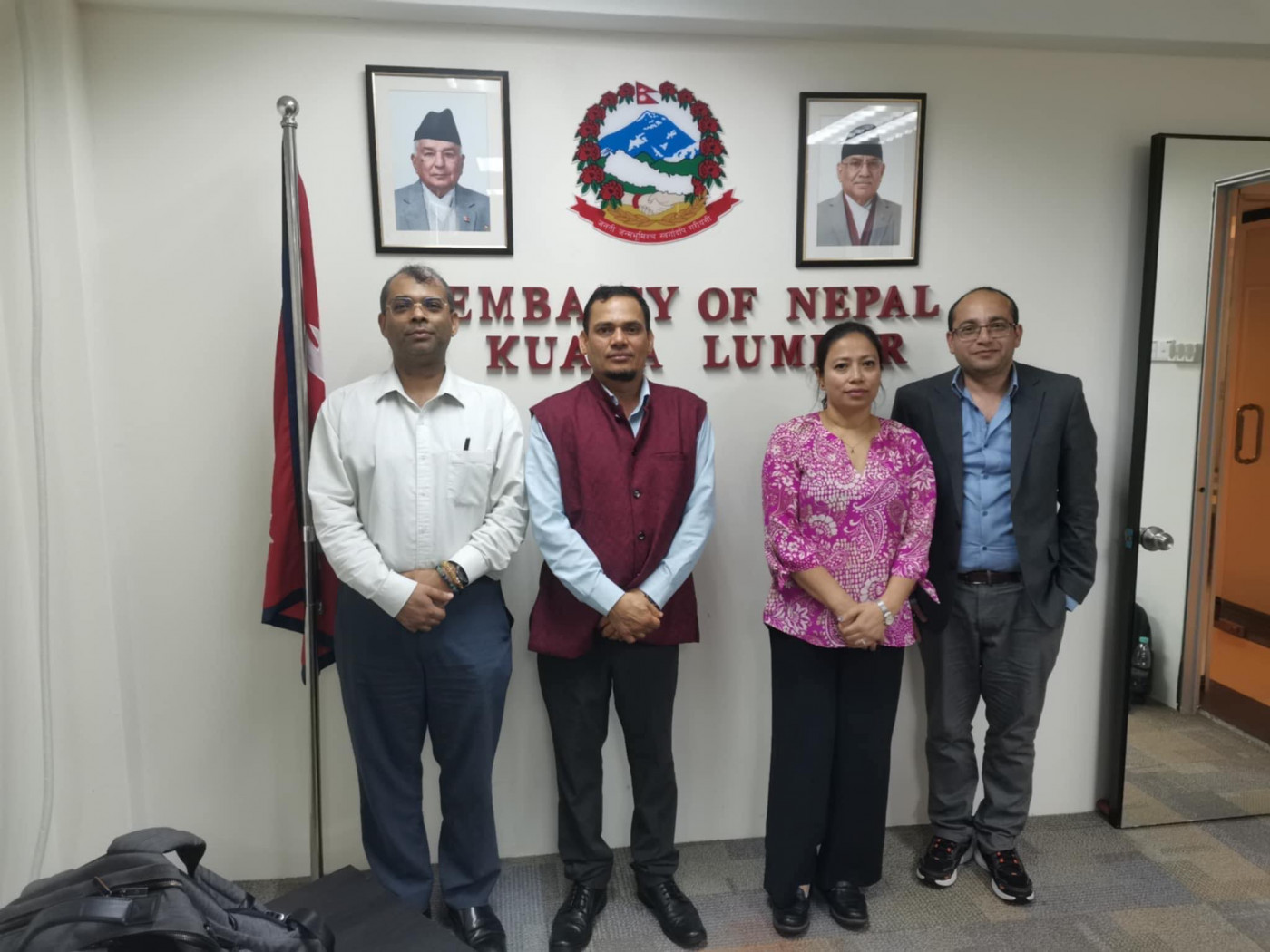 Today Nirmal also met with the Ambassador of Nepal in Kuala Lumpur (Malaysia) who expressed a great interest in our work.
Today Nirmal also met with the Ambassador of Nepal in Kuala Lumpur (Malaysia) who expressed a great interest in our work.
Nirmal is on a double mission as building links in Malaysia is also important for our latest funded project ‘ENSURE‘. ENSURE is a project led by La Isla Network in the United States of America. La Isla Network, Johns Hopkins University Bloomberg School of Public Health (based in the U.S.), the Nepal Development Society and Bournemouth University are leading the first-ever international effort to research and address trafficking among Nepalese labour migrants. The work is funded by a $4 million cooperative agreement awarded by the U.S. Department of State’s Office to Monitor and Combat Trafficking in Persons, International Programs.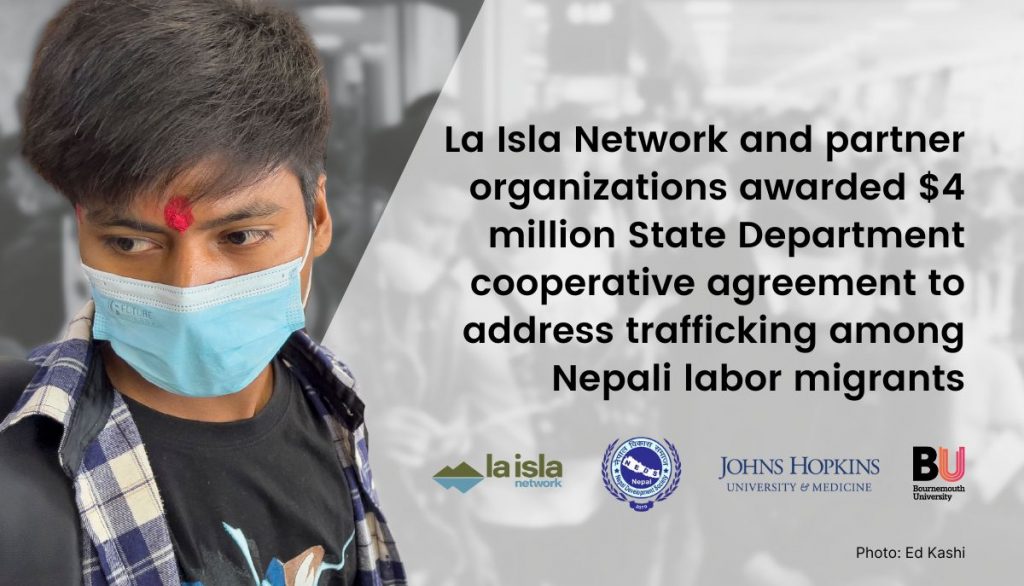
BU Research Conference 2024: Powerful partnerships
The third annual BU research conference event took place on Wednesday. This year’s theme centred around partnership and collaboration in research, exploring some of the opportunities and challenges around working with others.
As well as attendees from across BU, we also greeted guests from other local universities and partner organisations.
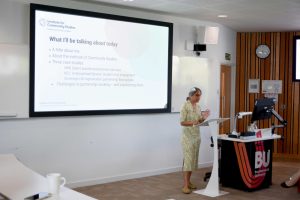
Isabella Pereira from the Institute for Community Studies
Following the official opening by Professor Sarah Bate, we welcomed keynote speaker Isabella Pereira, Head of the Institute for Community Studies (ICS).
Isabella talked through several case studies of research undertaken by the ICS – from supporting an NHS Trust’s suicide bereavement service to student engagement with marginalised communities and reaching residents as part of a regeneration project.
She also shared her advice on working effectively with communities, including meeting people ‘where they are’ and considering the impact of potential power imbalances and differing values and expectations.
This was followed by a lively panel discussion. Chaired by Professor Lee Miles, the panel (Professor Carol Clark, Professor Sam Goodman, Professor Zoheir Sabeur and Dr Mili Shrivastava) shared their experiences of building and maintaining partnerships and took audience questions on topics including dealing with ‘gatekeepers’ and factoring networking opportunities into workloads.
Key themes emerged around the need to build and develop trust as part of any partnership, building a strong profile to help facilitate opportunities and build networks, and managing different stakeholder interests.
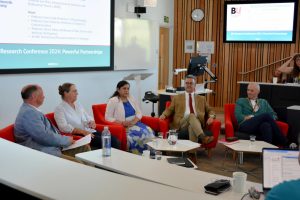
The Building Partnerships Panel Discussion
A range of workshops offered the opportunity to hear more about the work being undertaken at BU and gain practical tips and strategies for working with different partners.
Topics covered included co-creating research with under-served communities, working with community and voluntary organisations, international research collaboration, working with business, and collaborating for research knowledge exchange in the Ukraine and Sierra Leone.
Following some closing reflections from Andy Scott, Head of RDS, the day concluded with a conference lunch, offering an opportunity to network and continue conversations.
The Research Conference is an annual event organised by the Research Excellence Team in RDS to bring BU’s academic and research community together to learn, share, network and discuss key topics from the world of research.
A big thank you to everyone who supported or attended this year’s conference. If you have any feedback or suggestions of topics for future years, please get in touch at research@bournemouth.ac.uk
RKEDF: New Generation Thinkers 2025 – AHRC/BBC Radio 4

RKEDF: New Generation Thinkers 2025 – AHRC/BBC Radio 4 – Thursday 11th July – 11:00-12:30 – F112 – Fusion Building – Talbot Campus
Facilitated by: Professor Richard Berger
This is our annual new generation thinkers’ workshop, where we look at the call, requirements, eligibility and having a panel chair and member’s point of view. For early career researchers and PGRs who want to share their research with the public.
Call information: Develop your media skills with the New Generation Thinkers scheme
New Generation Thinkers is a career development scheme for early career researchers to:
- develop their communication and media skills
- get their research in front of the general public
The scheme is a partnership between the Arts and Humanities Research Council (AHRC) and the BBC.
If your application is successful, you’ll learn how to communicate research findings to the widest possible audience.
The scheme gives participants the opportunity to:
- create programme ideas with experienced BBC producers at workshops
- work with the team at BBC Radio 4 to get your ideas on air
- get media training
- take part in a workshop around engaging policymakers
- get involved with the AHRC-funded Being Human Festival
New Generation Thinkers has run since 2010. Each year a number of applicants are invited to create ideas with the BBC, of which we select the next cohort of New Generation Thinkers.
You can: read about the scheme’s achievements over the first 10 years – find the currently open New Generation Thinkers funding opportunity on the UKRI funding finder once it’s launched.
Previous winners: see a list of previous winners – listen to content created by previous winners on BBC Sounds (search for New Generation Thinkers) – read New Generation Thinkers magazine
Book your place here – under “New Generation Thinkers 2025″ in the drop-down menu
For any queries regarding this workshop, please contact RKE Development Framework
ADRC gets a shout out on BBC Radio Solent – listen to the interview here
Dr Catherine Talbot was interviewed by Fern Buckley on BBC Radio Solent on Tuesday 11th June. Catherine spoke about the work the ADRC does to enhance the quality of life of older adults and people living with dementia, as well as supporting their families and the professionals who work with them.
She also promoted the “Ageing Well Together!” event which celebrates ageing and brings together members of the public, researchers, service users, carers, and professionals.
Keep up to date with our latest research and other exciting news by following us on @BournemouthADRC or www.bournemouth.ac.uk/adrc
RKEDF: UKRI Assurance and compliance for externally-funded grants

Thursday 20th June – 10:00-11:30 – Hybrid – Poole House, Talbot Campus
Thursday 20th June – 13:00-14:30 – Hybrid – Gateway Building, Lansdowne
UKRI Assurance and compliance for externally-funded grants
This workshop is aimed at staff who have active UKRI-funded grants, or are in the process of applying for UKRI-funded grants. The workshop will cover; how UKRI conduct its assurance and compliance visits (audits), what you as a principal investigator or co-investigator need to be aware of, how to prepare, and the support you can expect to receive from Research Development & Support. By the end of the workshop, you’ll be aware of the common pitfalls and what you can do to ensure a positive outcome if UKRI pick your project as part of their assurance and compliance process.
The external facilitator for these sessions is Charles Shannon
Please note there is an AM and a PM session on the same day. You are invited to attend online or in person.
Book your place here – under “UKRI Assurance” in the drop-down menu
For any queries regarding this workshop, please contact RKE Development Framework
RKEDF: ECRN: Where do you begin with Research funding?

ECRN: Where do you begin with Research funding?
Friday 12th July – 10:00-12:00 – Online
The workshop is aimed at researchers from across BU at either postdoctoral or early career stage. It will focus on funders including (but not limited to) the AHRC, UKRI, British Academy, Welcome Trust, and NIHR.
Are you an Early Career Researcher interested in applying for research funding but unsure where to start? In this BU ERC Network special session, professional bid writing consultant Sally Baggott (PhD) offers her insights in the contemporary funding landscape for ECRs, as well as a comprehensive guide on how to improve your bid writing skills, how to work with external partners, and how to apply for funding at BU. The workshop will give an overview of various funding schemes currently available to ECRs, discuss what funders look for within their subject remits and evaluation, and demystify the process of application.
The facilitator for this event is Sally Baggott – Find out more here.
Book your place here under ‘ECRN – Where do you begin with Research funding?‘ in the drop-down menu.
For any queries regarding this workshop, please contact RKE Dev Framework
FHSS academics’ paper cited 1,000 times
This morning ResearchGate alerted us that our paper published two decades ago ‘The Importance of Pilot Studies’ has now been cited one thousand times [1]. This methods paper in the Nursing Standard is very often used by authors quoting a paper in their research methods section when they have done pilot or feasibility study for a larger-scale study. This paper is also our second top cited paper with 1,982 citations on Google Scholar and, interestingly enough, on SCOPUS it is not listed at all.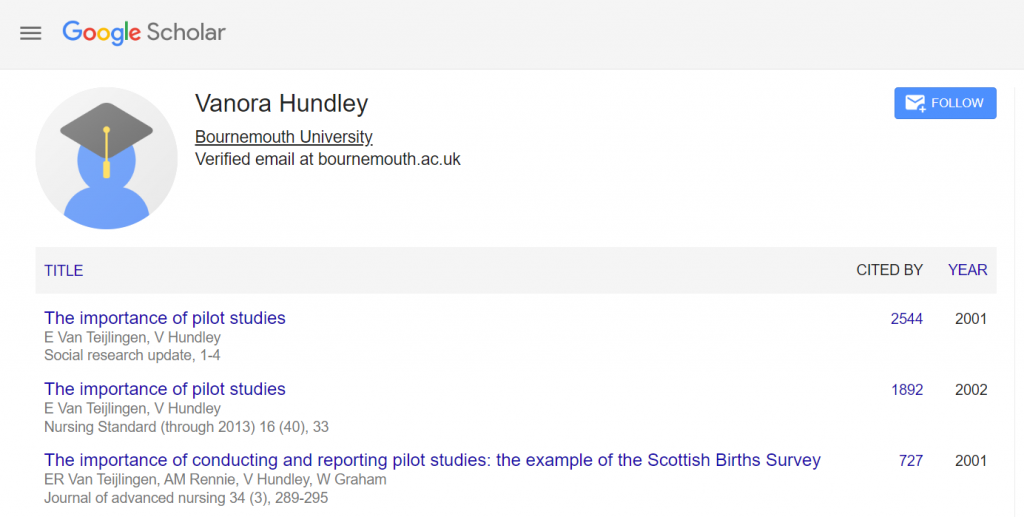
Pilot studies are a crucial element of a good study design. Conducting a pilot study does not guarantee success in the main study, but it does increase the likelihood of success. Pilot studies fulfill a range of important functions and can provide valuable insights for other researchers. There is a need for more discussion among researchers of both the process and outcomes of pilot studies. 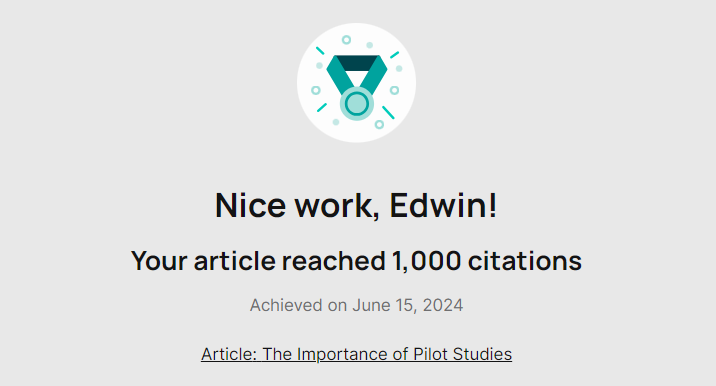
This paper is one of several methods paper focusing on pilot studies we have published over the past 22 years [2-8].
Professors Vanora Hundley & Edwin van Teijlingen
Centre for Midwifery & Women’s Health
References:
- van Teijlingen E, Hundley, V. (2002) ‘The importance of pilot studies’ Nursing Standard 16(40): 33-36. Web: nursing-standard.co.uk/archives/vol16-40/pdfs/vol16w40p3336.pdf
- van Teijlingen E, Rennie, AM., Hundley, V, Graham, W. (2001) The importance of conducting & reporting pilot studies: example of Scottish Births Survey, Journal of Advanced Nursing, 34: 289-95.
- Simkhada, P, Bhatta, P., van Teijlingen E (2006) Importance of piloting questionnaire on sexual health research (Letter), Wilderness & Environmental Medical Journal, 17(4): 295-96. wemjournal.org/wmsonline/?request=get-document&issn=1080-6032&volume=017&issue=04&page=0295#Ref
- van Teijlingen E, Hundley, V. (2001) The importance of pilot studies, Social Research Update Issue 35, (Editor N. Gilbert), Guildford: University of Surrey. Web: http://www.soc.surrey.ac.uk/sru/SRU35.html
- Hundley, V., van Teijlingen E.
- van Teijlingen E, Hundley, V. (2005) Pilot studies in family planning & reproductive health care, Journal of Family Planning & Reproductive Health Care 31(3): 219-21.
- (2002) The role of pilot studies in midwifery research RCM Midwives Journal 5(11): 372-74.
- van Teijlingen E, Hundley, V. (2003) Pilot study, In: Encyclopaedia of Social Science Research Methods, Vol. 2, Lewis-Beck, M., Bryman, A. & Liao, T. (eds.), Orego, Sage: 823-24.
The Missing Persons Indicator Project: Research Collaboration for Knowledge Exchange
The Missing Persons Indicator Project, initiated several years ago by Professor Melanie Klinkner and Andreas Kleiser from the ICMP, has recently been enhanced by a visit to the ICMP, aimed at optimising knowledge exchange. Its goal is to showcase each state’s relationship with missing persons through comprehensive data analysis. This initiative began as a collaborative effort, with data gathering undertaken by undergraduate students at Bournemouth University, engaging students in real-world research and ensuring the project’s sustainability by welcoming new students each September.
Since its inception, the project has been fortunate to work with many enthusiastic students who have completed the first round of Structural Indicator 1. This indicator demonstrates the commitment of states to international legal instruments. The table below outlines the current indicators involved in our data collection process:
| Context Indicator | A qualitative assessment as to whether the state has experienced extraordinary events that may be correlated to a rise in missing persons cases. |
| Structural Indicator 1 | The commitment shown by states to international legal instruments is an indicator of their duties and obligation in relation to missing persons. |
| Structural Indicator 2 | Domestic legislation by states as an indicator of their duties and obligation in relation to missing persons. |
| Structural Indicator 3 | Institutional framework(s) established by states as an indicator of their duties, obligation, and enactment of legislation in relation to missing persons. |
Thanks to HEIF funding, the Missing Persons Indicator Project recently had the opportunity to employ four student volunteers over the past two weeks. Their task was to accelerate the data collation for these indicators. By working through each indicator on a state-by-state basis, they developed a comprehensive understanding of each state’s unique situation. This method also allowed them to recognise and utilise specific details that might recur across the different indicators.
Every day, a designated “data-checker” reviewed previously inputted data to identify and correct any anomalies. This rigorous review process ensures the data’s accuracy, ethical integrity, and suitability for international dissemination.
Throughout this process, the students have been deeply engaged, asking insightful questions that challenged our perspectives and prompted us to consider aspects we might have overlooked. The atmosphere has been a hub of activity and intellectual growth.
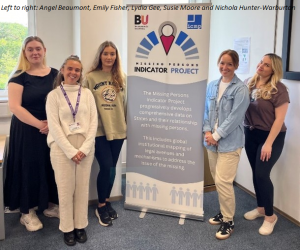
We are extremely grateful for the hard work and dedication of our student researchers. Their contributions have demonstrated that a student ‘data-lab’ is an excellent model for conducting research and achieving meaningful results.
As this term draws to a close, we are keen to alert teaching staff to the potential for their students to join the Missing Person Indicator project in September as we recruit a new cohort for the new academic year. To learn more about the project please visit our website!
Parkinson’s disease information day
Tuesday 18 June, 10am-3pm
Bournemouth Gateway Building, Lansdowne
This event is open to all BU staff, students and anyone with an interest in Parkinson’s disease, including researchers, those working in practice and members of the public, please help spread the word about this upcoming event.
Lunch and refreshments will be provided. For further information contact: adrc@bournemouth.ac.uk
To book your place visit: www.bournemouth.ac.uk/parkinsons-disease
This event is supported by funding from British Society of Gerontoloqy’s (BSG) Small Events fund.
For more information about the BSG, visit https://www.britishqerontology.org/
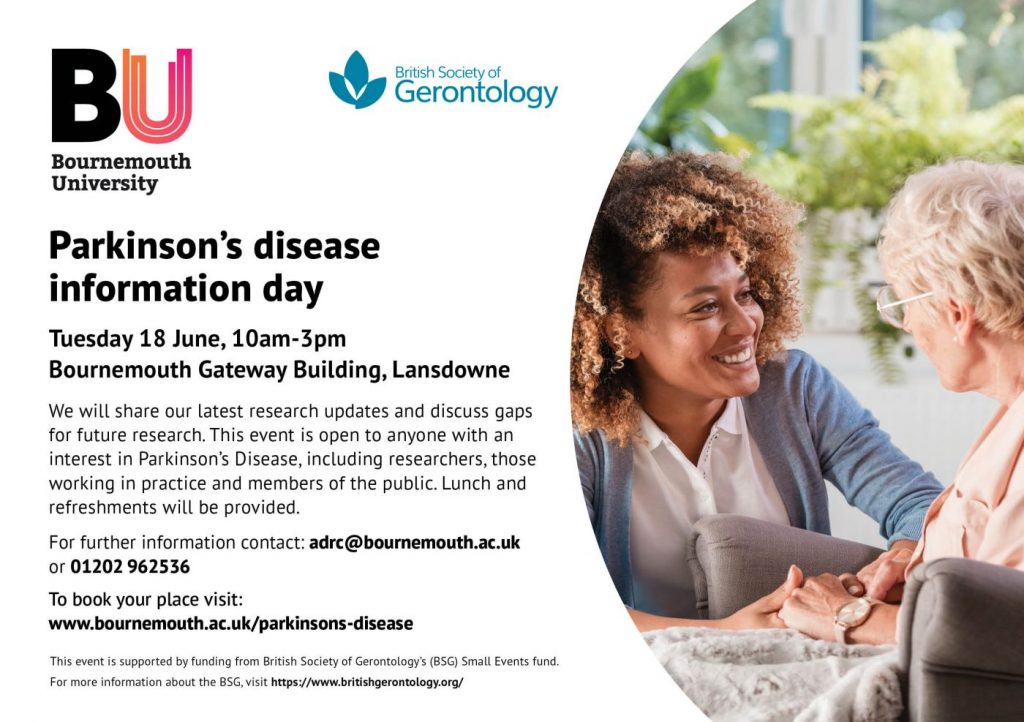
Ageing well together event – Thursday 13th June
The Ageing & Dementia Research Centre are delighted to be hosting “Ageing well together” an event bringing together members of the public, community organisations and researchers for an interactive day to share knowledge and showcase various projects and activities. The event will be in BGB on the Thursday 13th June 10.00- 15.00.
Please invite friends and family to join us. We ask that they register through our Eventbrite link https://www.bournemouth.ac.uk/events/ageing-well-together
Any questions about the event please email adrc@bournemouth.ac.uk












 New weight change BU paper
New weight change BU paper One week to go! | The 16th Annual Postgraduate Research Conference
One week to go! | The 16th Annual Postgraduate Research Conference Geography and Environmental Studies academics – would you like to get more involved in preparing our next REF submission?
Geography and Environmental Studies academics – would you like to get more involved in preparing our next REF submission? Congratulations to three former BU staff
Congratulations to three former BU staff Applications are now open for 2025 ESRC Postdoctoral Fellowships!
Applications are now open for 2025 ESRC Postdoctoral Fellowships! Horizon Europe – ERC CoG and MSCA SE webinars
Horizon Europe – ERC CoG and MSCA SE webinars ERC grants – series of webinars
ERC grants – series of webinars MaGMap: Mass Grave Mapping
MaGMap: Mass Grave Mapping Last reminder – MSCA Postdoctoral Fellowships 2024 internal deadline next week
Last reminder – MSCA Postdoctoral Fellowships 2024 internal deadline next week